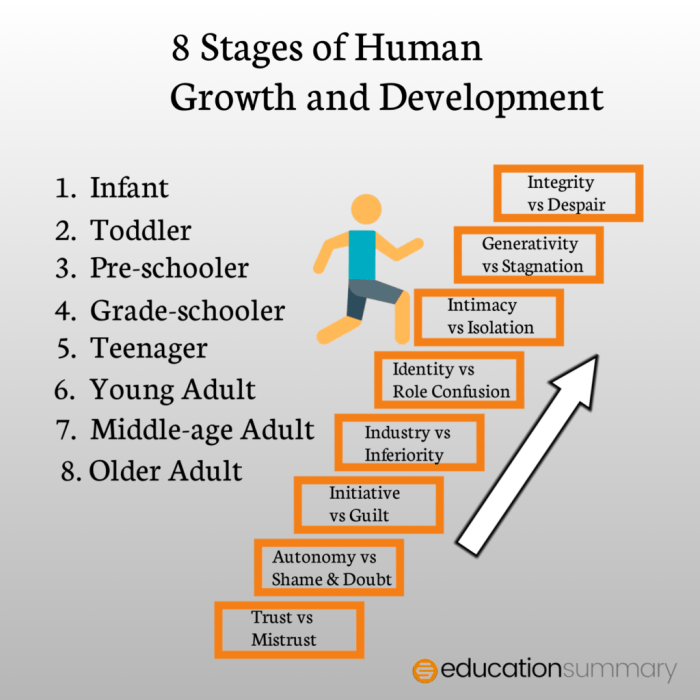The journey of adulthood 9th edition – Embarking on The Journey of Adulthood: 9th Edition, this comprehensive guide delves into the multifaceted nature of adulthood, examining the developmental stages, social and cultural influences, identity formation, career paths, relationships, health and well-being, and ongoing personal growth that shape this transformative period of life.
Through an engaging and authoritative narrative, this book provides a roadmap for navigating the complexities of adulthood, empowering individuals to make informed decisions, foster meaningful connections, and achieve personal fulfillment.
Developmental Stages of Adulthood

Adulthood encompasses a series of developmental stages, each characterized by distinct physical, cognitive, and emotional changes. These stages include:
- Early adulthood (ages 18-35): Marked by physical maturity, increased independence, and exploration of career and romantic relationships.
- Middle adulthood (ages 35-65): A period of stability and consolidation, with a focus on career, family, and personal growth.
- Late adulthood (ages 65 and older): Characterized by physical and cognitive changes, as well as a shift towards reflection and meaning-making.
Social and Cultural Influences on Adulthood
Social and cultural factors play a significant role in shaping the experience of adulthood. These influences include:
- Family: Family relationships provide support, guidance, and a sense of belonging throughout adulthood.
- Peers: Friendships offer companionship, emotional support, and opportunities for social engagement.
- Social norms: Cultural expectations and norms influence adult behaviors, beliefs, and values.
Identity Formation in Adulthood, The journey of adulthood 9th edition
Adulthood is a time of ongoing identity formation. This process is influenced by:
- Relationships: Romantic partnerships, friendships, and family connections contribute to the development of a sense of self.
- Work: Career experiences and accomplishments shape adult identity.
- Personal experiences: Significant life events, such as travel, education, and volunteerism, contribute to self-discovery and identity exploration.
Work and Career Development
Work and career play a central role in the journey of adulthood. Factors influencing career choices and trajectories include:
- Education: Educational attainment and qualifications influence career opportunities.
- Values and interests: Personal values and passions guide career choices and satisfaction.
- Economic conditions: Economic factors, such as job availability and market trends, shape career paths.
Relationships and Family in Adulthood
Relationships and family connections are central to adult life. These include:
- Romantic partnerships: Intimate relationships provide companionship, emotional support, and a sense of belonging.
- Friendships: Friendships offer social support, emotional connection, and opportunities for shared experiences.
- Family roles: As adults, individuals may assume new family roles, such as parents or grandparents, which bring both challenges and rewards.
Health and Well-being in Adulthood
Maintaining physical, mental, and emotional well-being is crucial in adulthood. Factors contributing to health and well-being include:
- Lifestyle choices: Healthy habits, such as exercise, nutrition, and stress management, promote well-being.
- Social support: Strong social connections provide emotional support and a sense of belonging.
- Purpose and meaning: Engaging in meaningful activities and pursuing personal goals contribute to overall well-being.
Personal Growth and Development
Personal growth and development are ongoing processes throughout adulthood. This process is influenced by:
- Learning and reflection: Continuous learning and self-reflection contribute to personal growth.
- Experiences: Life experiences, both positive and negative, provide opportunities for learning and growth.
- Challenges and setbacks: Overcoming challenges and setbacks builds resilience and promotes self-discovery.
Clarifying Questions: The Journey Of Adulthood 9th Edition
What are the key developmental stages of adulthood?
The key developmental stages of adulthood include early adulthood (ages 18-25), middle adulthood (ages 26-64), and late adulthood (age 65 and older). Each stage is characterized by distinct physical, cognitive, and emotional changes.
How do social and cultural factors influence the experience of adulthood?
Social and cultural factors, such as family, peers, and social norms, significantly shape the experience of adulthood. These factors influence career choices, relationship patterns, and expectations for personal growth and well-being.
What is the role of work and career in the journey of adulthood?
Work and career play a central role in adulthood, providing individuals with a sense of purpose, identity, and financial stability. Factors such as job satisfaction, career advancement, and work-life balance are important considerations throughout adulthood.
How can individuals foster meaningful relationships in adulthood?
Building and maintaining meaningful relationships in adulthood requires effort and commitment. Communication, empathy, shared values, and a willingness to compromise are essential for nurturing healthy and fulfilling relationships.
What are the challenges and opportunities for personal growth and development in adulthood?
Adulthood presents both challenges and opportunities for personal growth and development. Embracing new experiences, seeking knowledge, and reflecting on life experiences can facilitate ongoing self-discovery and self-improvement.

